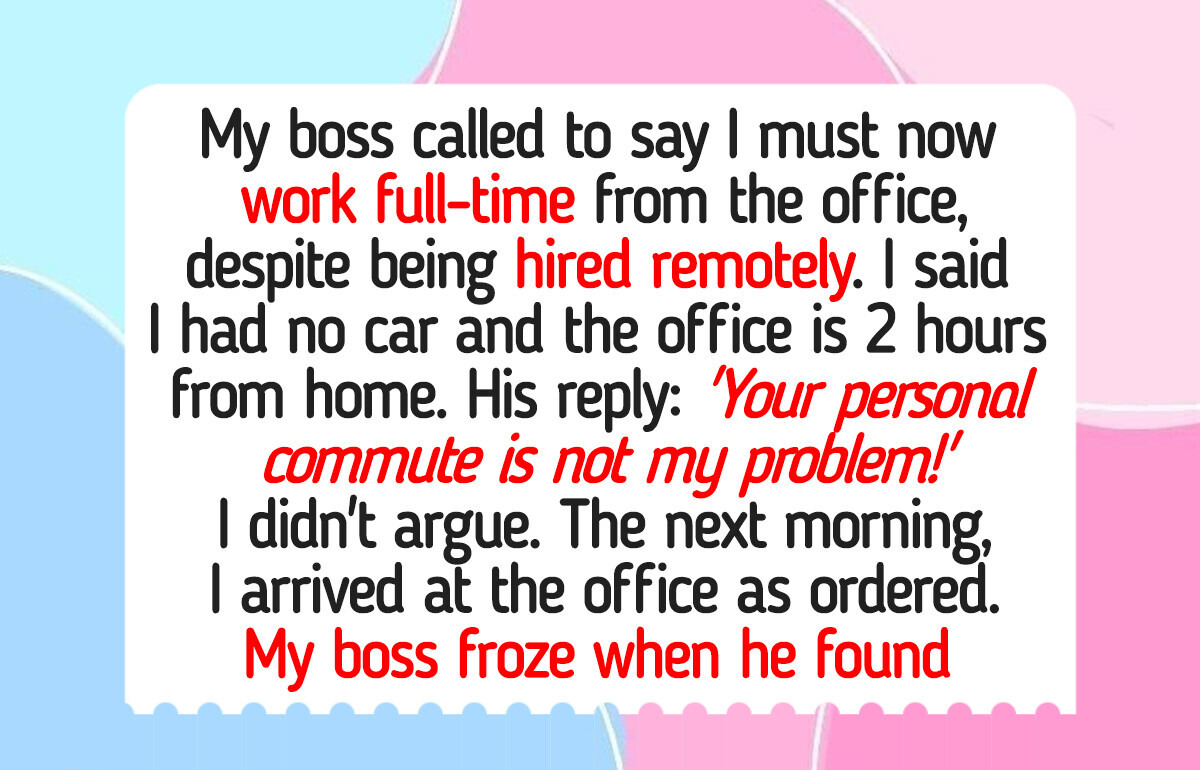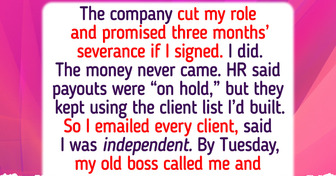Yes you definitely overplayed your hand. I get the fact you were hired as a remote worker, but working for a company does not entitle you to anything! Company's change rules all the time. If you want to continue to be employed by this company, roll with the flow and quit belly-aching. Im not trying to pre-judge here, but you appear to me a melinnial which all seem to be entitled.
I Refused to Work From the Office After Being Hired Remotely—My Boss Took It to HR

Work can sometimes bring us unexpected challenges, especially when the rules suddenly change. Many of us have faced situations where we had to adjust quickly, even if the new circumstances felt unfair or overwhelming. At Bright Side, we love sharing real stories from people who find unique ways to deal with such challenges. Recently, one of our readers sent us a letter about an unusual way she responded when her boss demanded she return to the office full-time.

Here’s Sandy’s letter:
Hi Bright Side,
A few days ago, my boss called to say I must now work full-time from the office, despite being hired remotely. I said I had no car and the office is 2 hours from home. His reply: “Your personal commute is not my problem!”
I didn’t argue.
The next morning, I arrived at the office at exactly 8:00 a.m., just as ordered. My commute had taken three transfers and more than 2 hours, but I made sure to step through the door right on time—dragging a small rolling suitcase behind me.
My boss froze the moment he saw it. He smirked and asked if I had mistaken the office for the airport. What he didn’t know was that inside the suitcase I had secretly put a blanket, a pillow, a kettle, and three days’ worth of snacks.
I smiled sweetly and replied, “Since I don’t have a car and the commute eats up 4 hours a day, I thought it would be best if I just lived here during the week.”

Then I set about unpacking. A pillow on my desk chair. A blanket draped neatly over the back. Oatmeal packets stacked in the break room. Before long, I was boiling water with my travel kettle and offering tea to my bewildered coworkers.
By lunchtime, I was cross-legged under my desk, answering emails like a college student cramming in a dorm room. That was when my manager finally pulled me aside, whispering that this was “highly unprofessional.”
I tilted my head and said, “Well, my commute may not be the company’s responsibility, but my ability to do my job is. This way, I’ll never be late.”
Word traveled quickly. By the next day, two colleagues with equally brutal commutes had brought their own blankets and joked about starting a “cubicle hostel.” HR soon appeared, clearly irritated, asking whether this was really necessary.
Now I can’t help wondering if I’ve overplayed my hand. What started as my personal protest has drawn others in, and I’m beginning to worry it could backfire. Maybe I should have just kept my head down and accepted the change.
But then again, wasn’t it unfair for the company to make such a sudden, drastic decision in the first place?
— Sandy

Sandy, what the company did was unreasonable. Requiring a sudden, full-time return to the office from an employee hired remotely without prior notice, discussion, or accommodation fails to take into account the practical impact on your ability to work and suggests a lack of good-faith consideration. An employer’s right to set workplace expectations is not unlimited, and significant changes to working conditions should be handled fairly and thoughtfully.
At the same time, while your response may not be illegal, it was legally and professionally risky. Turning the situation into a visible protest by bringing personal living items into the office could reasonably be characterized by the company as unprofessional or disruptive, which may expose you to discipline under internal policies rather than resolving the underlying issue.
Ultimately, much depends on the country you are in and the exact wording of your employment contract. Labor laws vary widely, and your contract may limit the employer’s ability to change your work location or require advance notice. Reviewing both local law and your contract terms, and addressing the issue through formal, documented channels, would place you in a stronger and safer position going forward. Lastly you can start finding a job that works best for you.
Good luck!
Thank you, Sandy, for opening up about your experience. Your situation is something many people can relate to. It’s never easy when work expectations change so suddenly, especially in a way that affects daily life. Your story made us think about the many ways someone can handle such a situation.
Here are our tips for you:
Negotiate a fair compromise with your boss.
Instead of leaning into the protest, you could try framing your situation as a shared challenge rather than a personal inconvenience. Request a formal meeting with your boss or HR and calmly outline the facts: the commute time, transportation limits, and how it affects your productivity.
Make it clear that you’re willing to work from the office some days, but propose a hybrid schedule as a compromise. Present data showing how much more effective you are when not drained from travel. By shifting the tone from “rebellion” to “problem-solving,” you could turn a conflict into a win-win.
Use humor to highlight the absurdity.
Sometimes humor and creativity make a stronger point than anger. Your “cubicle hostel” idea already drew attention, why not double down and turn it into a satirical mini-campaign? Create funny “welcome packs” for new “residents” of the office, or mock posters advertising the “new corporate housing plan.”
This would highlight the absurdity of the commuting expectation in a lighthearted way. Just be cautious not to go too far, because humor works best when it stays playful and doesn’t openly embarrass leadership.

If the company you worked for moved the office across town turning your 10 minute walk to work into a 45 minute drive, what would you do? Company's change structure and policies all the time. Work smart, you may need this company as a reference down the road.
Reevaluate if the job is really worth it.
If HR is already irritated and your boss is unwilling to bend, it may be time to reassess whether this job is worth the toll. A 4-hour commute eats into your health, personal life, and long-term happiness.
Start discreetly exploring opportunities closer to home or with companies that value flexibility. Even if you stay for now, knowing you have options will give you more confidence in handling the situation. Sometimes the best protest is simply choosing not to accept unfair terms and moving on.
Gather your coworkers and speak as one.
Your coworkers joining in shows this isn’t just your issue—it’s a wider problem. Instead of handling it alone, you could channel this energy into a united effort.
Draft a respectful letter to HR signed by all affected employees, explaining the negative impact of the commute on morale and performance. Offer a realistic alternative, like a hybrid schedule or flexible hours, as a compromise. A collective approach often carries more weight, and it signals that management’s decision is creating broader dissatisfaction, not just personal inconvenience.
Workplace stories often highlight the tension that arises when personal values and professional ambitions intersect. These moments can raise important questions about fairness, respect, and balance in the workplace. Here’s another example of a clash between an employee and management: I Told My Boss I’m Vegan, Now HR Got Involved.
Comments
Sometimes I wonder if Brightside lives in the real world with their advice.
Related Reads
18 Employees Who Saw Their Choices Backfire Hard

12 Life Stories That Prove Kindness Is a Safe Oasis Amidst Life’s Chaos

I Refuse to Give Up the Passenger Seat for My MIL—She Should Learn Her Place

My Daughter Disrespected My Sacrifices—And I Refused to Let It Slide

I Refused to Be Treated Like a Maid in My Own Home—So I Changed the Rules

I Refused to Be a Free Hotel for My Late Son’s Family: They Eclipsed My Life

I Refused to Follow My Boss’s Dress Code—HR Had to Step In

I Refuse to Accept Being “Grandfathered In” at $15K Less Than New Hires

I Refuse to Drop College to Take Care of My Sick Sister, I Am Not Her Nurse

I Refuse to Be Treated as Less Reliable Because I’m a Single Mom

10+ Stories That Prove Quiet Kindness Is All Around Us, Even When No One Is Watching

I Lost My Job to “Restructuring” and My Severance Disappeared, Then I Turned the Tables
